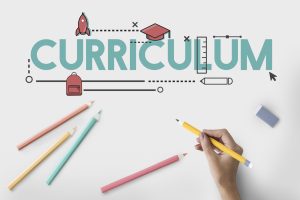Contents
- 1 Types of Curriculum Based on Educational Level
- 2 Types of Curriculums Used in K-12 Online Schools
- 3 Structure of a Curriculum
- 4 Pros and Cons of Curriculum
- 5 What to Consider in a Curriculum When Choosing a K-12 Online School
- 5.1 Does the curriculum align with state or national standards?
- 5.2 Does the curriculum have enough electives that fit the child’s interests?
- 5.3 How is student progress evaluated?
- 5.4 Does the curriculum offer advanced courses for gifted students?
- 5.5 Is there flexibility in the curriculum to accommodate different learning styles?
- 5.6 Are there opportunities for hands-on learning and project-based activities?
- 5.7 How does the curriculum integrate technology and digital tools?
- 5.8 What support is available for students who need extra help?
- 5.9 Does the curriculum prepare students for college or career paths?
- 6 Conclusion
Online education is an integral part of today’s life. Many students and parents find it hard to choose the right online education. The curriculum is a key tool to help them with that choice. But what is a curriculum?

Curriculum in K-12 online schools is a structured educational program for students from kindergarten through 12th grade. Curriculum covers core subjects like math, science, English, and social studies. Electives and specialized courses are also included in the curriculum. It meets educational standards and gives students flexibility. Students learn at their own pace while meeting grade-level requirements. We will explore the curriculum to help parents and students understand it better.
Types of Curriculum Based on Educational Level
Curriculum in online education divides into different types based on the goals and age of the students. We’ll consider the six main types of curriculum with brief descriptions.
Elementary School Curriculum
Curriculum for elementary school (K-5) focuses on basic academic skills. These skills include reading, writing, math, and science.
Middle School Curriculum
Curriculum for middle school (6-8) includes deeper exploration of core subjects. This curriculum introduces complex concepts in science and math. It helps students to develop critical thinking and analytical skills. There are more opportunities for students to choose elective courses.
High School Curriculum
Curriculum for high school (9-12) includes more specialized courses, college preparation, and career development. Students choose advanced courses (AP), vocational programs, and prepare for exams. The exams include Scholastic Assessment Test (SAT) and American College Testing (ACT).
College Prep Curriculum
College preparation focuses on courses for college admission. College preparation includes AP courses, essay writing courses, and preparation for standardized tests.
Vocational Curriculum
Vocational programs offer courses and certifications in specific professions. These professions include IT, healthcare, design, and more.
Adult Education Curriculum
Courses for adults offer to continue an adult’s education, change careers, or gain additional skills. Courses for adults include general education and professional certifications.
Test Prep Curriculum
Test preparation programs offer to prepare students for various exams. These exams include Graduate Record Examination (GRE), Graduate Management Admission Test (GMAT), and others.
Supplementary Curriculum
Supplementary courses help students deepen knowledge in specific subjects or provide extra tutoring to boost performance.

Types of Curriculums Used in K-12 Online Schools
“Increasingly, educators are rethinking the books and stories that have been mainstays of school curriculum for years; and embracing the importance of offering a more diverse range of texts that can help students better understand themselves, other people, and the world around them”
Dr. Kimberly Parker, Facing History

K-12 online schools use a variety of curricula to meet students’ diverse needs. Table below shows the eight main types of curricula used by online schools with brief descriptions.
| TYPE OF CURRICULUM | SHORT DESCRIPTION |
|---|---|
| Core curriculum | Core curriculum focuses on essential subjects like math, science, English, and social studies. Core curriculum provides a strong academic foundation |
| Elective curriculum | Elective curriculum offers additional courses aligned with students’ interests. These courses include classes in arts, music, foreign languages, and technology |
| AP curriculum | AP curriculum provides college-level courses in high school. AP curriculum enables students to earn college credit and prepare for higher education |
| Career and technical education (CTE) curriculum | CTE curriculum focuses on practical skills and vocational training in different fields. These fields prepare students for specific careers |
| Special education curriculum | Special education curriculum tailored to meet the needs of students with disabilities. This curriculum provides individualized support and learning strategies |
| Gifted and talented curriculum | Gifted and talented curriculum helps advanced learners. It offers challenging coursework to stimulate intellectual growth |
| Project-based curriculum | Project-based curriculum emphasizes hands-on learning. This curriculum focuses on projects integrating multiple subjects. The focus helps students to develop critical thinking and problem-solving |
| Blended curriculum | Blended curriculum сombines online learning with in-person instruction. This curriculum offers a flexible approach to fit different learning styles |
Structure of a Curriculum
The structure of a curriculum includes several key components. These components ensure comprehensive educational development for students. Table below lists seven main components of a curriculum with brief descriptions.
| COMPONENT OF CURRICULUM | SHORT DESCRIPTION |
|---|---|
| Core subjects | Fundamental disciplines. These disciplines include math, science, English, and social studies. Fundamental disciplines form the academic foundation |
| Elective courses | Additional let students explore areas of interest. These subjects include art, music, foreign languages, and technology |
| AP courses | AP courses enable students to earn college credit and prepare for higher education |
| Project-based learning | Integration of theory and practice happens through. These projects develop critical thinking and problem-solving skills |
| Assessment and testing | Evaluation of student knowledge occurs through tests, quizzes, and projects. This evaluation helps track progress and identify areas needing improvement |
| Social and emotional skills | Programs aim to develop communication, collaboration, and emotional resilience skills. These skills are crucial for success in life and career |
| Career guidance | Courses and counseling help students choose a career path. They prepare students for employment or further education |
Understanding the curriculum helps parents and students choose the right school.
Pros and Cons of Curriculum
We covered what a curriculum is. Let’s look at the pros and cons of the curriculum to help parents and students choose wisely.
Benefits of K-12 Online School Curriculum
The K-12 online school curriculum offers four benefits for students and parents:
- Students learn at their own pace and schedule
- The curriculum allows students personalized learning
- The curriculum is accessible anywhere
- Access to a wide range of subjects, including advanced and specialized options
Challenges of K-12 Online School Curriculum
The curriculum comes with drawbacks for parents and students to consider. Parents and students weigh three drawbacks to avoid choosing the wrong online school:
- The curriculum misses real-world social skills sometimes
- The curriculum isn’t available without internet access
- The focus is too much on tests, limiting creative thinking
What to Consider in a Curriculum When Choosing a K-12 Online School

Curriculum is the roadmap for choosing the right online school for students. Parents and students ask these questions to see if the curriculum fits the student’s needs.
Legacy Online School offers an accredited curriculum for elementary, middle, and high school. Legacy Online School’s curriculum covers core subjects. These subjects include Language Arts, Math, Science, and Social Studies. Students choose electives like Spanish and Art. This curriculum includes live teaching in small groups for personalized attention.
Legacy Online School’s curriculum won “The Best Homeschool Curriculum, Products & Resources!“ award. This win shows the school’s strong focus on quality, innovation, and helping students succeed.
Does the curriculum align with state or national standards?
Review the school’s accreditation and official documents to check if the curriculum meets state or national education standards. Look for this information on the school’s website or ask the school directly. Make sure the school is recognized by educational authorities so your child’s education is valid and respected.
Does the curriculum have enough electives that fit the child’s interests?
Review the course catalog or curriculum guide provided by the school. Check if there’s a broad range of electives. See if the electives are diverse enough for your child to explore different fields and develop their passions.
How is student progress evaluated?
Ask the school how they assess students. Find out if they use tests, quizzes, projects, or ongoing evaluations. Check if these methods fit your child’s learning style.
Does the curriculum offer advanced courses for gifted students?
Look at the curriculum or course catalog to see what advanced courses are available. Ask how the school identifies and supports gifted students.
Is there flexibility in the curriculum to accommodate different learning styles?
Ask if the curriculum is flexible and adapts to different learning styles. These styles include visual, auditory, or kinesthetic. See if the school offers personalized learning plans or adaptive technologies.
Are there opportunities for hands-on learning and project-based activities?
Check if the curriculum includes project-based learning, lab work, or other hands-on activities. Ask how the school manages hands-on learning online and if students do physical projects or experiments at home.
How does the curriculum integrate technology and digital tools?
See how the school uses technology in the curriculum. Ask about the digital tools and platforms they use for teaching and learning. Check if the technology actually improves learning or just replaces traditional methods.
What support is available for students who need extra help?
Ask the school about support for students who need extra help. Find out if the school offers tutoring, counseling, or one-on-one sessions. Check if they have staff or resources for students with learning difficulties or special needs.
Does the curriculum prepare students for college or career paths?
Look at the curriculum to see if it includes college prep courses, career programs, or counseling services. Ask the school about graduate success rates, like college acceptance or career placement. Check if the school offers help with college applications, SAT/ACT prep, and internships or job shadowing.
Parents and students check the curriculum or ask these questions to the online school. They find another online school if the current one doesn’t meet the student’s needs.
Conclusion
Curriculum is the structured educational program outlining what students will learn throughout their schooling. Parents and students must understand the structure. Review the curriculum before choosing a K-12 online school to ensure the best educational experience. We have covered the types of curricula, their structures, and the questions to ask about the curriculum before selecting an online school.











